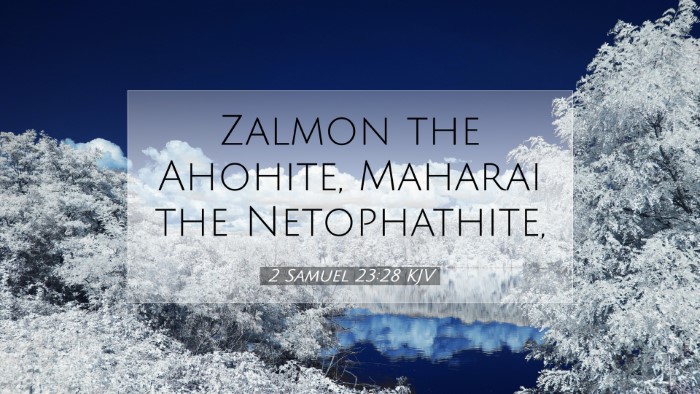Commentary on 2 Samuel 23:28
Bible Verse: "Abiathar the son of Ahimelech, of the priests which were with David, was one of the mighty men of David." (2 Samuel 23:28)
Introduction
This verse highlights the significant role of Abiathar within the context of David’s trusted associates and his loyal warriors, referred to in the passage as "mighty men." Understanding Abiathar's character and his contributions to David’s reign offers a deep insight into leadership, loyalty, and the intricacies of divine providence as depicted in the biblical narrative.
Contextual Overview
The period leading up to this verse is crucial for establishing the backdrop of David’s administration and the trials that accompanied his kingship. Abiathar, who descends from Ahimelech, an early high priest, symbolizes the interplay between priestly duties and royal authority during a tumultuous time in Israel's history.
The Role of Priests in David's Time
The priestly office in Ancient Israel was integral to both the spiritual and political spectrum of the nation. Abiathar’s presence signifies the blending of religious leadership with military support, indicating that spiritual guidance was deemed essential in the governance of Israel. Likewise, public domain commentaries such as those by Matthew Henry suggest that the participation of the priesthood in military efforts reflects a holistic approach to leadership in Israel, ultimately effecting both reverence for God and effective governance.
Character Analysis of Abiathar
Commentaries emphasize Abiathar’s character traits, particularly his courage and loyalty. He remained with David through significant challenges, including the strife caused by King Saul. As noted by Albert Barnes, Abiathar's loyalty serves as a testament to his faithfulness to God and to David, especially as he faced persecution and danger while fleeing from Saul.
- Courage: Abiathar's willingness to align himself with David despite the risks encapsulates the bravery embedded in God’s chosen leaders.
- Loyalty: His loyalty is emphasized as he becomes one of the few that remain with David during his most perilous times, signifying the importance of steadfastness in companionship.
Theological Implications
The implications of 2 Samuel 23:28 extend beyond mere historical recounting; they offer rich theological insights that are valuable to both scholars and students of the Word.
Divine Providence
The presence of Abiathar as a 'mighty man’ reflects the theme of divine providence. God orchestrates circumstances, placing individuals in specific roles to fulfill His purpose. Adam Clarke notes that the mention of Abiathar among David's warriors highlights the divine backing David received, implying that even in adversity, God raised loyal followers who would stand firmly by His anointed leader.
God's Faithfulness amidst Trials
This verse serves as a reminder of God's faithfulness. During the challenges faced by David, Abiathar’s loyalty exemplifies how God provides steadfast supporters in times of turmoil, reinforcing the notion that God’s plan prevails against adversity.
Lessons for Modern Leadership
For pastors, students, and theologians, the narrative surrounding 2 Samuel 23:28 provides pertinent lessons applicable in contemporary contexts.
- The Importance of Loyalty: Just as Abiathar demonstrated loyalty amidst adversity, modern leaders are encouraged to cultivate loyalty within their congregations and teams. Faithful relationships often lead to collective strength.
- The Intersection of Spiritual and Secular Leadership: Abiathar illustrates the need for spiritual leaders who are also prepared to navigate the complexities of secular leadership, emphasizing the holistic role leadership plays in church and community.
- Building Resilience: The resilience demonstrated by Abiathar serves as a model for current believers facing trials; few achieve greatness without enduring hardship.
Conclusion
2 Samuel 23:28 encapsulates more than the historical account of Abiathar; it reflects themes of loyalty, divine providence, and the integration of spiritual commitments into leadership. The insights drawn from public domain commentaries, particularly from Matthew Henry, Albert Barnes, and Adam Clarke, enriched the understanding of this verse's significance. For modern readers—pastors, students, and theologians alike—this verse serves as a point of reflection on the qualities that foster enduring leadership and faithful companionship in service to God's purposes.


